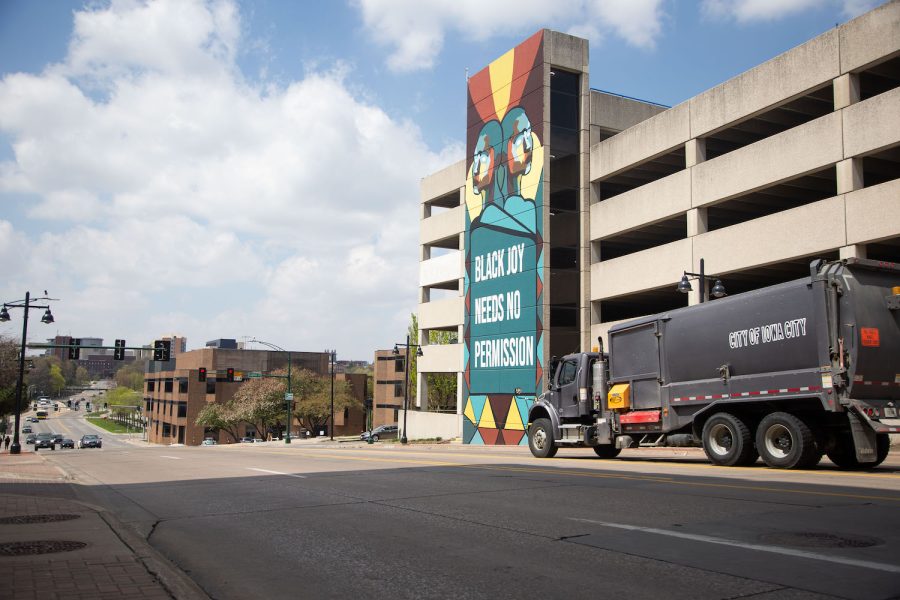New $67,000 contract between ICPD and the UI Public Policy Center to analyze racial profiling in traffic stops
ICPD collects data on traffic stops and is now utilizing the UI Public Policy Center to research racial disparities and profiling.
The Oracles of Iowa City Mural at the Old Capitol Parking Ramp in Iowa City on Tuesday, April 25, 2023.
April 30, 2023
The Iowa City Department of Public Safety and the University of Iowa Public Policy Center are taking a closer look at racial disparities during traffic stops conducted by local law enforcement.
The police department and the UI entered a $67,000 contract following Iowa City City Council approval April 25 to analyze traffic stops with data collected since 2006.
The UI will study the demographics of people pulled over with the intent to help reduce racial profiling at traffic stops.
ICPD started collecting data on traffic stops in 1999 and continued research into racial disparities during traffic stops in 2006 after entering into a contract with Chris Barnum, the director of the Master of Science in Criminal Justice program and professor at St. Ambrose University.
ICPD worked with Barnum from 2006 until 2020, with the last report published in 2021. ICPD Police Chief Dustin Liston said Barnum broke the city into smaller areas and sent researchers out to collect traffic counts to determine the racial makeup of drivers.
Liston said this approach gave a more holistic data set compared to census data that may not accurately reflect who is on the road. Liston said the transition from Barnum to the UI is because of proximity and new research methods.
“St. Ambrose is obviously not in Iowa City, but the University of Iowa is, so we thought it was a good opportunity to team with them, and I think it’s going to be a more robust study,” Liston said.
The contract with the UI Public Policy Center will last one year and will be evaluated after the time is allotted. One of the Public Policy Center’s core missions is to stay engaged with the local community, practitioners, and policymakers through policy research.
RELATED: ICPD, UI seeks approval to study racial disparities for traffic stops
Ethan Rogers, UI Public Policy Center assistant research scientist, said the new study will differ from previous data collection. Rogers and Public Policy Center Interim Director Mark Berg will lead the study.
Once the data is analyzed, the center will investigate what racial and ethnic disparities are present.
“In my view, this is a very comprehensive project bringing in multiple different statistical approaches,” Rogers said. “We try to provide that comprehensive lens.”
Rogers said the detail of the study would be descriptive to provide the most accurate data possible.
“So, in our view, that first step is understanding exactly when and where traffic stops are occurring and understanding why they’re occurring and how they’re occurring,” Rogers said.
Additionally, Rogers said he is excited to work with ICPD to create a more holistic approach to reducing racial profiling in traffic stops.
“It has been a good working collaboration,” Rogers said. “They’re very forthcoming with the data.”
Iowa City City Manager Geoff Fruin wrote in an email to The Daily Iowan that the future possibilities of the program would depend on if the Iowa City City Council approves a longer contract.
“The exact determination of the process may depend on the dollar amount of future contracts and whether the authority to execute those agreements rests with staff or the City Council,” Fruin wrote. “Regardless, the data collected, and final reports generated will always be shared with the City Council and the public.”
Liston said the efforts to record this data are essential for the future of policing in Iowa City and to show transparency in the policing process.
“It’s something that I think the community can be proud of. It’s one of the ways we’re trying to be transparent,” Liston said. “If it does show disproportionality, that’s not always great news for us, but it shows that we’re working on it. We’re not ignoring any issues.



